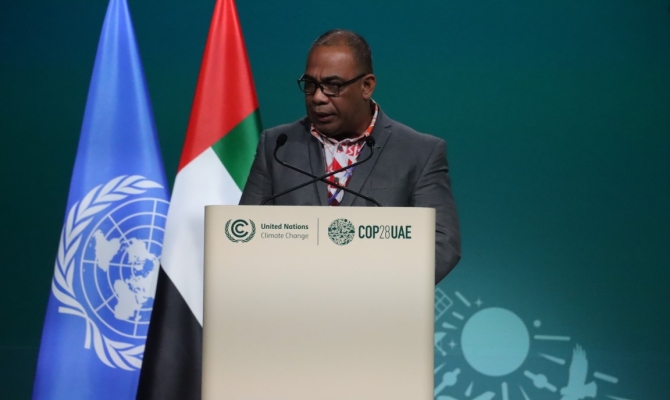
9 December 2023, UAE – Consisting of six major islands and approximately 992 small islands, atolls and reefs in an EEZ of 1.58 million square kilometers, Solomon Islands called for serious treatment of the ocean in the bodies and processes of the UN Framework Convention on Climate Change.
Addressing over 190 parties to the UNFCCC and more than 100 world leaders and ministers during the resumed high-level segment of the 28th Conference of the Parties, Solomon Islands raised the need for work in agriculture, ocean and gender.
“Solomon Islands recognises the inextricable connectivity between climate change and our ocean, which defines who we are as a people. As indigenous guardians of our ocean space, we are deeply concerned with the negative impacts of climate change on our ocean ecosystems, fishery resource, islands and livelihoods. We therefore urge and call for more serious treatment of ocean in the UNFCCC bodies and processes,” stated Dr Melchior Mataki, Permanent Secretary for the Ministry of Environment, Climate Change, Disaster Management and Meteorology.
“We are concerned with the lack of substantive decisions on Agriculture and the lack of its serious treatment in critical workstreams such as Global Stocktake. On Gender and Climate Change, we continue to go around circles on this important work stream. The Solomon Islands need climate finance to support gender-responsive and targeted programmes at the community level.”
Applauding the Presidency of COP28, the Solomon Islands commended the leadership of the United Arab Emirates in the historical early decision on the operationalisation of the Loss and Damage Fund at the start of the COP paying tribute to the parties that have made pledges to capitalise the fund.
While these are highlights of COP28, there are also serious concerns that must be addressed for the Solomon Islands, a key one being the pathway that will keep the promise of the Paris Agreement – the 1.5 degrees Celsius global temperature goal.
“We must address the root cause of climate change and the driver of loss and damage – by cutting and eliminating greenhouse gas emissions. The Solomon Islands wish to express our serious concern with the lack of progress in the first Global Stock Take (GST) and Global Goal on Adaptation. We are clearly off track with respect to the goals of the Paris Agreement and the window for meaningful change is closing up,” presented Dr Melchior.
“This first GST must be forward-looking, ambitious and inform the next Nationally Determined Contributions, and include tripling of renewable global renewable energy capacity by 2030, phase out fossil fuels, and mobilise finance for adaptation, mitigation, and loss and damage consistent with keeping global temperature rise below 1.5 degrees.”
Solomon Islands also called for financial resources to be mobilised to address adaptation and migration to be significantly grant-based, predictable, transformational and unencumbered with onerous access processes as experienced with the Green Climate Fund, Global Environment Facility and other multilateral funds.
Climate finance is a critical enabler of actions to help address climate change and it was action that Solomon Islands is seeking from over 190 parties to the UNFCCC as the Conferences of the Parties have been happening for many years.
“Our children and youths are expecting us to do the right and needful, to arrest, reverse and stop greenhouse gas emissions to rein in climate change,” We can negotiate as parties here, but it is clear, we cannot negotiate with climate change, and those of us that are disproportionately impacted by it, urge parties with historical responsibility and other major emitters to emancipate yourselves from fossil fuel addiction.”
Solomon Islands took the floor at the resumed high-level segment of COP28 on 9 December 2023.
The 28th Conference of the Parties to the UN Framework Convention on Climate Change (UNFCCC COP28) in Dubai, UAE is taking place from Thursday 30 November 2023 – Tuesday 12 December 2023. It is being attended by Pacific leaders and their delegations, who are advocating for the survival of Pacific communities that continue to be at the forefront of climate change impacts.